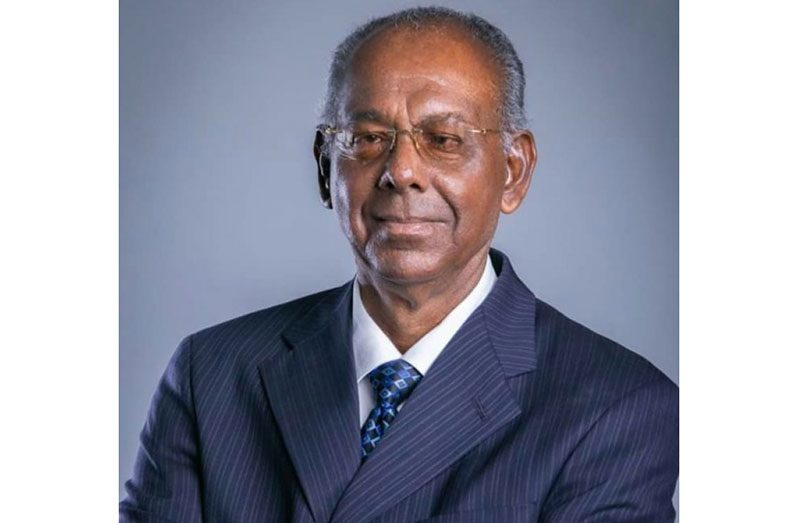–says Ramkarran
SENIOR Counsel Ralph Ramkarran has joined a growing list of persons who are rubbishing A Partnership for National Unity + Alliance For Change (APNU+AFC)’s claim that the current voters’ list is “bloated” and ought not to be used for the upcoming Local Government Elections (LGEs).
He has expressed disagreement with the party’s call for a changing of the law to include biometrics for voting purposes.
Ramkarran in a column titled “Bloat and Biometrics,” which was published on his blog, “The Conversation Tree,” on Sunday, also made it clear that there is no legal basis for the party’s position and moreso, that the current electoral systems are almost fraud-proof.
“Fraudulent voting is well-nigh impossible with the systems currently in place,” he said.
The Opposition’s talk of a “bloated” electoral list has ignited a flame due to its legal contradictions. The Opposition remains adamant that there should be a “cleaning” of the list.
Ramkarran, who is not only a Guyanese politician and lawyer but also the former Speaker of the National Assembly of Guyana, shared his expertise on how the electoral system is just.
“Prior to 1992 the Elections Commission, of which I was then a member, set out the basic structures which have existed until the present, supported by laws agreed to by both parties, for free and fair elections,” he said.
The Senior Counsel further explained that the implementation of voter identification cards for the 1997 elections gave rise to an iron-guarded electoral system.
Although the law was passed following unanimous agreement by both parties, Esther Perreira, a PNC representative, challenged the 1997 elections on the grounds that, among other things, the voter-identification law was unconstitutional and that, as a result, the PNC had broken its promise.
The law was declared unlawful by the court, which invalidated the 1997 elections. The court’s decision had the effect of making any law that prevented a voter from exercising their right to vote, other than those that were permitted by the Constitution, illegal.
“Determining ‘bloat’ on the basis of residency only is deception because non-residents are entitled to be on the electoral list,” said Ramkarran.
Article 59 of the Constitution states that “… every person may vote at an election if he or she is of the age of eighteen years or upwards and is either a citizen of Guyana or a Commonwealth citizen domiciled or resident in Guyana.”
Hence, the Opposition’s proposal is unconstitutional and poses the opportunity to rob non-residents of their constitutional right.
Furthermore, he highlighted the inconsistencies in the National Registration Act. The Act affirms the residency requirement for registration on the national register.
Generally, an order specifies how the electoral list will be taken from the national register. Due to the legal exclusion of non-residents with voting rights from the national register, which is from whence the electoral list is derived, this process is legally faulty.
“With an electoral list excluding non-residents, and the high rate of emigration, two electoral cycles down the road, the issue of a bloated list will once again arise, posing a problem in perpetuity,” he insisted.
Ramkarran asserted that due to the systems in place, fraudulent voting is quite nearly impossible.
However, the Opposition refuses to face reality and continues to imply that the People’s Progressive Party/Civic (PPP/C) rigged the 2020 elections by some 100,000 fraudulent voters.
The repetitive and baseless argument of electronic fingerprinting is now the Opposition’s new suggestion at the place of poll.
“The Opposition has not explained, having regard to the Esther Perreira case, how it will overcome the unconstitutionality of a fingerprinting law, which will provide an obstacle to voting, just as the voter identification law did,” he said before questioning whether the Constitution should be amended “in this political atmosphere.”
Based on the foregoing, it is clear that he does not believe that biometrics for electoral purposes will be feasible for Guyana.
“I have already pointed out in a previous article the equipment that would be needed: 2,000 electronic fingerprinting equipment, 2,000 transmitting equipment to a screen, 2,000 screens, electricity equipment for places that have no electricity and for blackouts. And with the increased needed for fingerprinting, wouldn’t voting have to be configured with many more polling stations? And how many hundreds of millions more?” he said in closing.
Leader of the Opposition, Aubrey Norton, earlier this month had acknowledged that the voters’ list used in the 2015 General and Regional Elections had issues, notwithstanding the APNU+AFC party accepting its success at the elections where that list was used.
Norton, who is also Leader of the People’s National Congress/Reform (PNC/R) and Chairman of the A Partnership for National Unity (APNU), was questioned on whether his party had concerns about the voters’ list in 2015 when it won government.
Pressed by journalists during his weekly press conference as opposition leader, he admitted that his party did have concerns, but claimed that the coalition tried to correct the issues with the voters’ list after 2019.
Despite this admission, he continues to strongly advocate for the voters’ list to be “cleansed.”













